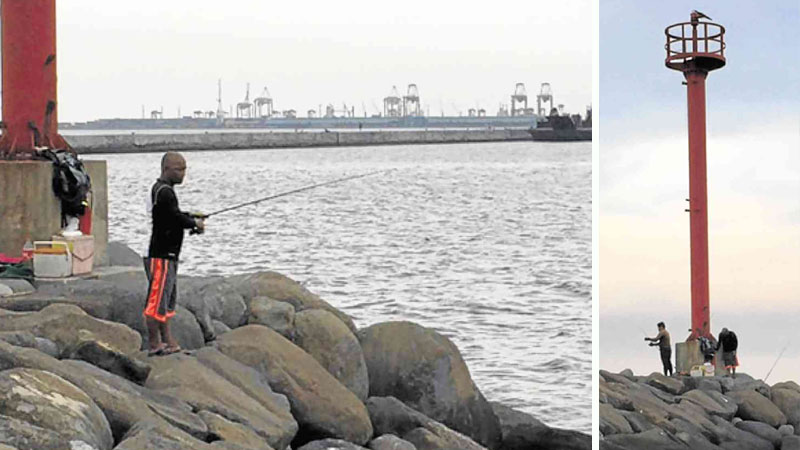‘Dirty’ Manila Bay? Tell it to these weekend fishermen

FISHING every weekend on the “halang” has become a welcome respite for the Santos brothers and a handful of men. The lure of the bay and the added excitement of catching fish keep them coming back for more despite storms or rough waters. AIE BALAGTAS SEE
TO “DE-STRESS” after a busy week at work, brothers Victor and Virgilio Santos have spent many Sundays savoring the thrill of hook-and-line fishing—and seemingly proving that Manila Bay isn’t all that bad despite being depicted often in the media as an environmental disaster.
The siblings are no rich kids with an expensive hobby but typical employees who have succumbed to the lure of the sea.
Early in the morning, with their fishing gear and an ice box containing shrimps for bait, they take a cab from their Makati City residence to the Manila Yacht Club area. They then rent a boat—one of the small motorized banca waiting along the breakwater.
From there, the boat takes them to another breakwater whose tip extends some 1.8 nautical miles off the Roxas Boulevard coastline: a 400-meter stretch of rocks and boulders simply called the “halang,” a Filipino term for something horizontal. The area is considered part of Manila’s waters.
“If it’s truly dirty here, how come marine life remains abundant in this part of Manila Bay?” Victor said when the Inquirer joined him and his brother on a recent fishing trip. The only stinky areas are those near the coastline where sludge and tons of garbage wash up, he noted.
Standing on the halang facing west, one can make out the outlines of Manila South Harbor on the right and the SM Mall of Asia in Pasay City on the left.
That Sunday morning, a family from Baseco compound in Tondo, Manila, was having a picnic in the same area, grilling the grabs and fish they had just caught.
“Sometimes you reel in a good one, sometimes you go home empty-handed. That’s part of it,” said Victor, a 50-year-old technician at a pump distributor and manufacturing company.
Whatever the brothers catch is cooked at home: threadfin salmon, grouper, mullet, croaker fish, red snapper and rockfish.
But then, they find their ultimate reward not in their filled bellies but in their rested spirits. “When I go fishing, my problems just go away, my mind just focused on the fish; nothing but the thought of catching one. I pay no mind even if there is a storm or the waters are rough,” Virgilio said.
The Santoses spend around P500 for the shrimps which they buy fresh at Cartimar, Pasay, before proceeding to the bay. A round trip banca service would cost between P500 and P1,000. “It’s not cheap, that’s why we usually go in groups,” Victor said.
The boat operators would take them to the halang usually around 6:30 a.m. and return to fetch them at 4:30 p.m.
Mario Francisco, an office worker, believes fishing has “healed” him of his longtime vice. “I used to drink a lot. I quit after I developed this love for fishing. Now I’d rather spend my money doing this than on liquor.”
Francisco rides his bike from his home in Manila to Roxas Boulevard, and often finds himself joining a group of around 10 men who chip in and rent a boat for P1,500.
According to Lt. Commander Joselito Maluyo, assistant deputy chief of the Philippine Coast Guard’s maritime safety services, the halang actually marks an anchorage area where only ships are allowed. “Fishermen and their motor bancas can be considered a hazard to the traffic there.”
But why the name halang? Victor said he had picked up a piece of local lore that it was short for “halang ang kaluluwa”—a phrase reserved for evil doers.
Jayson Verzosa, a 22-year-old boatman, cited another tale, saying people started calling it halang after a deadly maritime accident occurred near the breakwater in the mid-1990s.
Whether those stories hold water, so to speak, that’s more bad press for a bay that is world-famous for its sunset view but generally assumed to be a near-dead ecosystem sapped of all charm and fun.
Still, that has not stopped the weekend fishermen who apparently won’t mind if they remain a small Sunday crowd.














